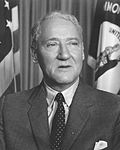Wikipedia:Today's featured article/August 23, 2014
John Sherman Cooper (1901–1991) was an American politician, jurist, and diplomat. He began his political career in the Kentucky House of Representatives (1927–29) before being elected as a county judge in 1930. After serving in the U.S. Army in World War II and reorganizing the Bavarian judicial system after Germany's defeat, he was a Kentucky circuit judge before winning election to the U.S. Senate in 1946. He was defeated in the 1948 election, but re-elected to partial terms in 1952 and 1956, serving as Ambassador to India in between. He was re-elected to the Senate in 1960 and 1966 by record margins for Kentucky. President John F. Kennedy chose Cooper to conduct a secret fact-finding mission to Moscow and New Delhi. Following Kennedy's assassination in November 1963, President Lyndon B. Johnson appointed Cooper to the Warren Commission to investigate the assassination. Cooper soon became an outspoken opponent of Johnson's decision to escalate U.S. military involvement in the Vietnam War. Aging and increasingly deaf, Cooper did not seek re-election in 1972. His last acts of public service were as Ambassador to East Germany from 1974 to 1976 and as an alternate delegate to the United Nations in 1981. (Full article...)
Recently featured: Liber Eliensis – Horse Protection Act of 1970 – Thirty Flights of Loving
